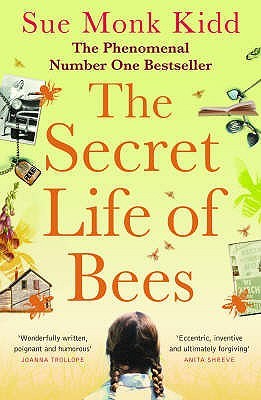Page count: 375 pages
Rating: 3.5 stars
Lily Owens grows up isolated, neglected by her father and lonely on a peach farm in Georgia in the 1960s. Her only friend is the woman who acts as her nanny, Rosaleen, a former field hand who's taken care of her since Lily's mother died in a tragic accident when Lily was little more than a toddler. When Rosaleen is forced to flee town after accidentally insulting some white men while on her way to registering to vote, Lily insists on coming with her. They decide to go to Tiburon in South Carolina, as one of the few things Lily has left after her mother is a small icon of a Black Madonna with the place name scrawled on the back.
As they make their way to Tiburon, Lily and Rosaleen discover that the Black Madonna is the logo of the honey produced by the three Boatwright siblings, who take the two in without asking too many probing questions. It is obvious that there is some kind of connection between the Boatwright sisters and Deborah Owens, Lily's mum, but it takes quite some time for Lily to gather up the courage to ask, afraid she'll be disappointed once more.
I was given this book as a birthday gift in 2005, and it's been languishing on my bookshelf ever since. Several friends have borrowed it, even, I just never got round to reading it. So when "life" was one of the key words for February in the Monthly Key Word Challenge this year, and with the book fitting into a whole slew of my other challenges, it felt like it was finally time to pick it up. It was a perfectly inoffensive little book, I just don't entirely think it was what I was in the mood for, and as such, I'm unable to rate it any more highly than I have.
Lily is understandably a character with a lot on her plate. Her mother died when she was little, and it seems clear from her hazy recollections of the event, that Lily is actually the one who accidentally killed her. Her father ignores and neglects her at the best of times, and straight up abuses her at the worst (making her kneel on corn grits until her legs bleed being a favoured punishment). She so desperately wants affection and a place to belong. When she finds the Boatwright sisters, who show her kindness and let her stay with them, she lies and claims to be an orphan, terrified that they're going to send her back to her father.
Lily is only 14, and as such, some of the things that annoyed me about her make perfect sense. Teenagers are frequently irrational and annoying, I should know, I work as a secondary school teacher. I still think her going from being curious about August's nephew to "ZOMG, I love him so much!" in the space of an afternoon a bit sudden, and I think some of her petulance and truculent attitude in the latter half of the book, once she discovers more about her mother, went on for too long and got exasperating. It's a perfectly sweet book, but it wasn't right for me during a rather stressful period. I certainly didn't like it as much as Genericwhitegirl, one of my fellow Cannonballers. I can't say whether the movie is a good adaptation or not, as I haven't seen it, but it looks to have a decent cast.
Crossposted on Cannonball Read.

I loved this book when I read it many years ago, but I can see how you would have to be in the right mood for it. It's got a quasi-mystical vibe that might or might not resonate. My husband is embarking on bee-keeping this spring, and have been meaning to reread the book to get me in the mood for bee-lore :)
ReplyDelete